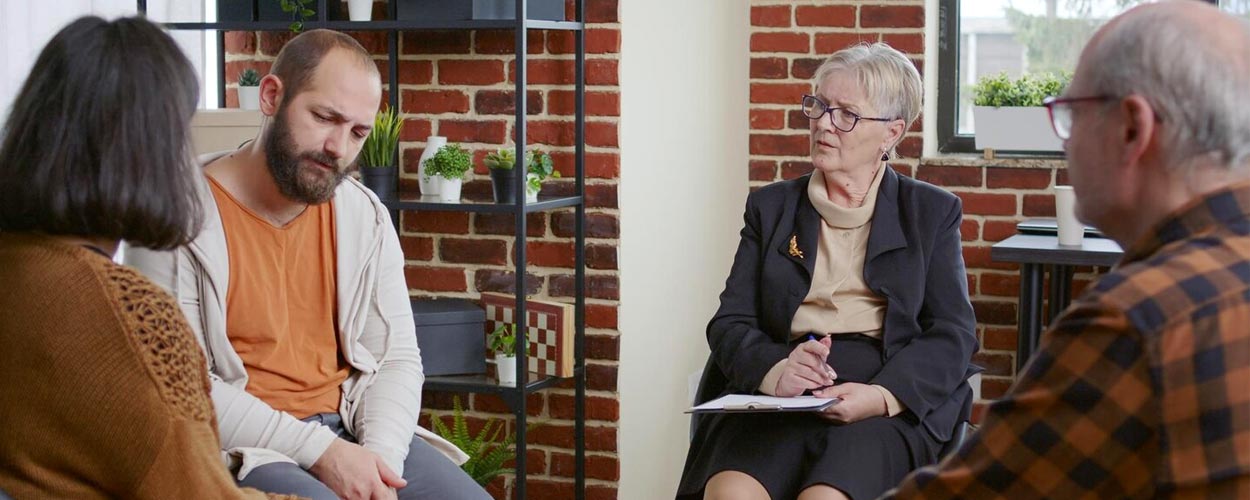
Dementia can be difficult because every individual has different needs. Caring for someone with dementia can feel overwhelming. However, the emotional and physical burden tends to be even heavier for caregivers. Caregivers have emotional stress and responsibility, which can be impactful. That is why caregivers need to be able to manage stress. Stress affects not only the caregiver, but may also affect the care provided. In this blog, we will discuss some tips and strategies to help caregivers stay positive and find balance. We will also discuss the value of a dementia caregiver support group and how it may make a positive difference in the caregiving journey.
Before understanding how to cope with stress, it is crucial to understand what makes caregivers overwhelmed. Dementia is a condition that affects not only memory but also behavior. This makes it difficult for older adults to perform daily tasks. The loved ones who are struggling with such a condition are heartbreaking. You may feel:
Recognizing these emotions is very important. It is absolutely normal to feel them; accepting these emotions allows you to start addressing them positively. The dementia support group can help you to overcome all these emotions.
Prioritize Self-Care Every Day
Caregivers put their loved ones’ needs as the topmost priority. However, self-care is not a selfish behavior; it is necessary. Here are some simple self-care habits to start with:
Rest Whenever Possible – Even a few minutes in quiet or a short nap can help refresh you.
Eat Healthy Meals – Don’t skip meals or eat unhealthy meals, as feeling hungry can lead to more frustration.
Exercise Regularly – Even a short walk, yoga, or stretch can help reduce tension and elevate mood.
Practice Relaxation Techniques – Stress can be relieved in many ways, including deep breathing exercises, meditation, or listening to slow, soothing music.
Take Breaks – It is okay to ask a family member or close friend, or a respite care service, so you can have time to rest.
When you take care of yourself, including mind and body, you will have more patience, energy, and compassion to care for your loved one.

One of the most effective ways to reduce stress as a caregiver is to connect with others who understand what you are going through. The dementia support group provides a safe place to share your experiences, hear from others, and feel emotionally supported. Support groups frequently provide:
Emotional Relief – Talking about your feelings helps you feel less alone.
Practical Advice – Learn new techniques and coping skills from caregivers in the group.
Encouragement – Hearing the success or positive experiences of family caregivers can elevate your mood.
Friendship – Support groups for dementia caregivers may lead to connections that develop into strong friendships.
Numerous organizations and communities, including local hospitals and local NGOs, offer dementia support groups, often both face-to-face and virtual. Joining dementia caregiver support groups may reduce feelings of isolation and provide reassurance.
Set Realistic Expectations
Dementia is highly unpredictable. There will be better days, and there will be worse days. In taking care of a person with dementia, it is crucial that you reduce your own stress as much as possible, and part of this is understanding that you will not be able to control everything. Here are some tips to manage your own expectations:
Focus On What You Can Control – While you cannot stop dementia from progressing, you can control your response to your caregiving challenges.
Don’t Strive For Perfection – It is about putting forth your best effort and not worrying about being perfect.
Celebrate Every Success – A quiet morning or a smile from your loved one is a great success.
Be Gentle With Yourself – A person living with dementia learns something new every day; you can too, and it is okay to make mistakes.
If you can learn to be gentle with yourself as a caregiver, you can reduce your stress and find meaning in the experience.
Learn More About Dementia
Understanding dementia and having knowledge of the disease can help reduce your anxiety. The more aware you are of dementia and the more information you have, the easier it will be to handle difficult situations. Consider reading, attending workshops, or participating in education programs offered by your local dementia caregiver support organizations. Understanding and recognizing the reasons behind your loved one’s behaviors can lead to a more compassionate response rather than frustration. For example, if your loved one forgets your name, remember it is likely due to the disease, not because of them. If your loved one is agitated and distressed, they may be confused, in pain, or scared. Knowing this provides meaning to their behavior and helps you manage the situation with patience and understanding.
Build A Strong Support Network
Although your intentions may be good, there is no way to do everything on your own. When you face a situation such as a family member’s dementia, it is worth investing in a support network. Your support network may include:
Family & Friends – Ask for assistance with meals or simply to be with your loved one for a few hours.
Community Resources – Your local health department or organizations may provide respite care, home help, or transportation services for community assistance.
Professional Help – The work of social workers, therapists, or home nurses can ease your responsibilities in caregiving or enable you to provide better quality care.
If you do not have many family and friends in your area, online support groups for dementia caregivers are another valuable resource. You can share experiences, ask questions, and even get emotional support at any time.
Create A Structured Routine
Routines create stability, not just for the person diagnosed with dementia, but also for the caregiver. Following a routine can:
Try to maintain regular meal times, regular medication schedules, and regular bedtimes. Predictability makes caring for your loved one easier and helps you stay organized.
Caring for a loved one with dementia takes lots of patience, love, and commitment. But don’t forget, you are human too. Your mental and physical health is equal to that of your loved ones. Self-care, participating in a dementia caregiver support group, developing a strong network, and taking small breaks can minimize your stress. At Star Capital, we believe caregivers should be cared for and shown compassion as much as the person they are caring for. You are doing a great job, and with the right dementia caregiver support, you can provide love and comfort while caring for yourself.
42220 Sweet Court
Chantilly, VA 20152
Phone : 571-406-7827
GOOSE CREEK MANOR
104 Marylin Street
Goose Creek, SC 29445
Phone : 843-572-7442
SHULER HEALTH CARE
250 pitts street, kernersville,
NC, 27284
Phone : 336-996-0772
CYPRESS MANOR
503 W Buncombe Street,
Roper, NC, 27970
Phone : 252-791-0002
ELTON RCH
30 W Main Street,
Waterbury, CT, 06702
Phone : 203-756-1229
Waterbury Garden RCH
128 Cedar Ave,
Waterbury, CT
Phone : 475-306-6888